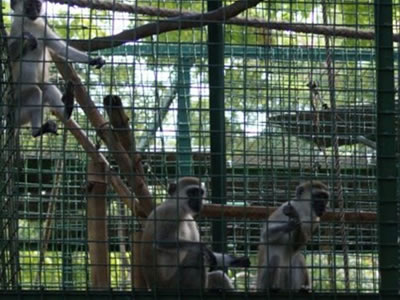Rehabilitation & Release

Rehabilitation at Colobus Conservation targets former pet primates with the view to returning them to the wild.
All primates are really cute and amusing when they are young, thus tempting some people to keep them as pets. These infants grow quickly and soon begin to mature. At this time, they become more aggressive as a natural behaviour to increase their dominance. Concurrently, they get bigger and grow longer canines, so when they bite (accidentally or otherwise) they do more damage. It is usually at this stage that most of the owners bring their pets to us.
Kenyan law does not permit keeping wild animals. Monkeys are wild animals. In a few cases, people found keeping or selling monkeys are arrested, charged in court or fined and their ‘pets’ confiscated. After being taken to court as ‘evidence,’ the monkeys are brought to us.
After their quarantine period, the monkeys begin their rehabilitation. This entails the re-learning of behaviours of wild monkeys, learning what foods to eat, learning how to interact with the other monkeys and learning that humans are not friends.
In order for them to learn how to be monkeys and how to interact with wild ones we have built large mesh cages through which they can see and touch the wild individuals living in and around the offices of Colobus Conservation. This way they see how the hierarchy levels operate, the various calls and their meanings, and if they make friends, they can give each other a groom.
![]() To learn which foods to eat we give them a wide variety of wild leaves, flowers, fruits and seeds.
To learn which foods to eat we give them a wide variety of wild leaves, flowers, fruits and seeds.
To learn that humans are not friends, we limit contact with them, do not make any friendly sounds at them and also they watch the reaction of other monkeys to us so that by the time they are ready to leave, they are not seeking human attention as they often do when they first come in.
This process can take a varying amount of time depending on the monkey, how long it was a pet, and whether it stayed in the house or was allowed to live in a semi-wild state.
The monkeys are continuously assessed. Colobus Conservation works to do a release every two to three years.
As monkeys are social animals, re-introductions are done in groups of ex-captives giving each individual a greater chance of surviving. In a group, each individual comes with its own memories of how to live wild so that they learn from each other. A group gives them greater safety from predators and the sociability that they require.
